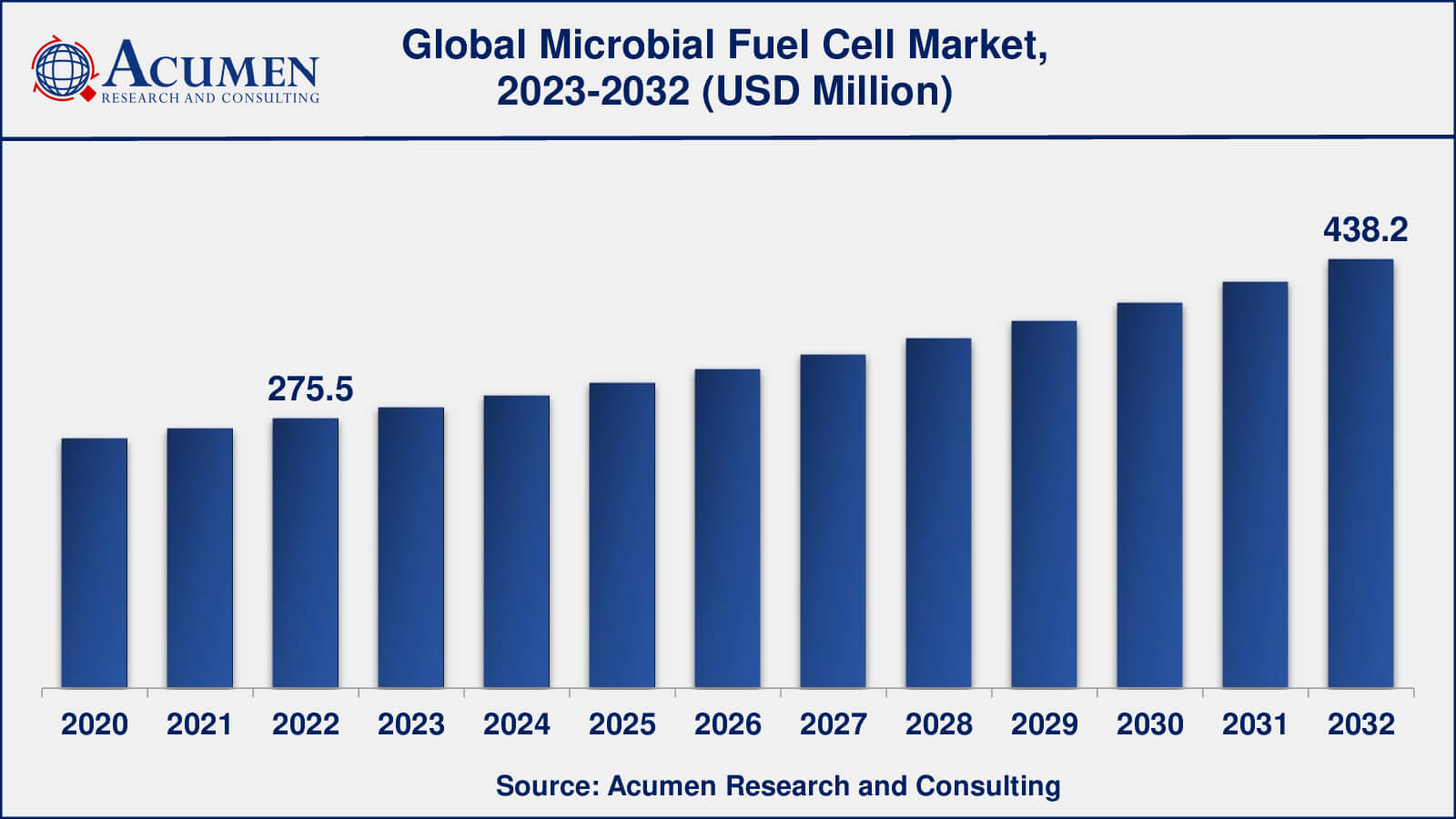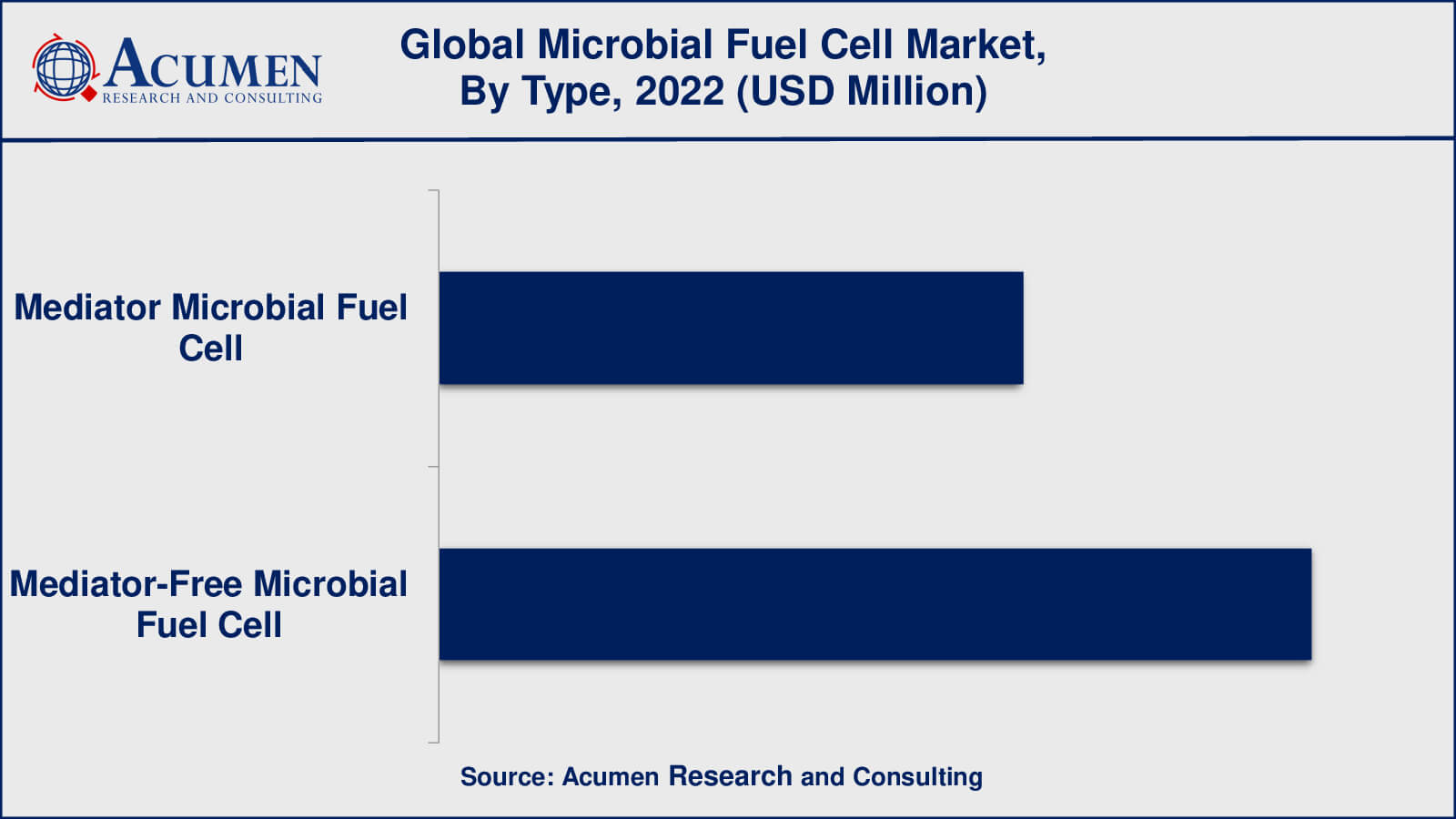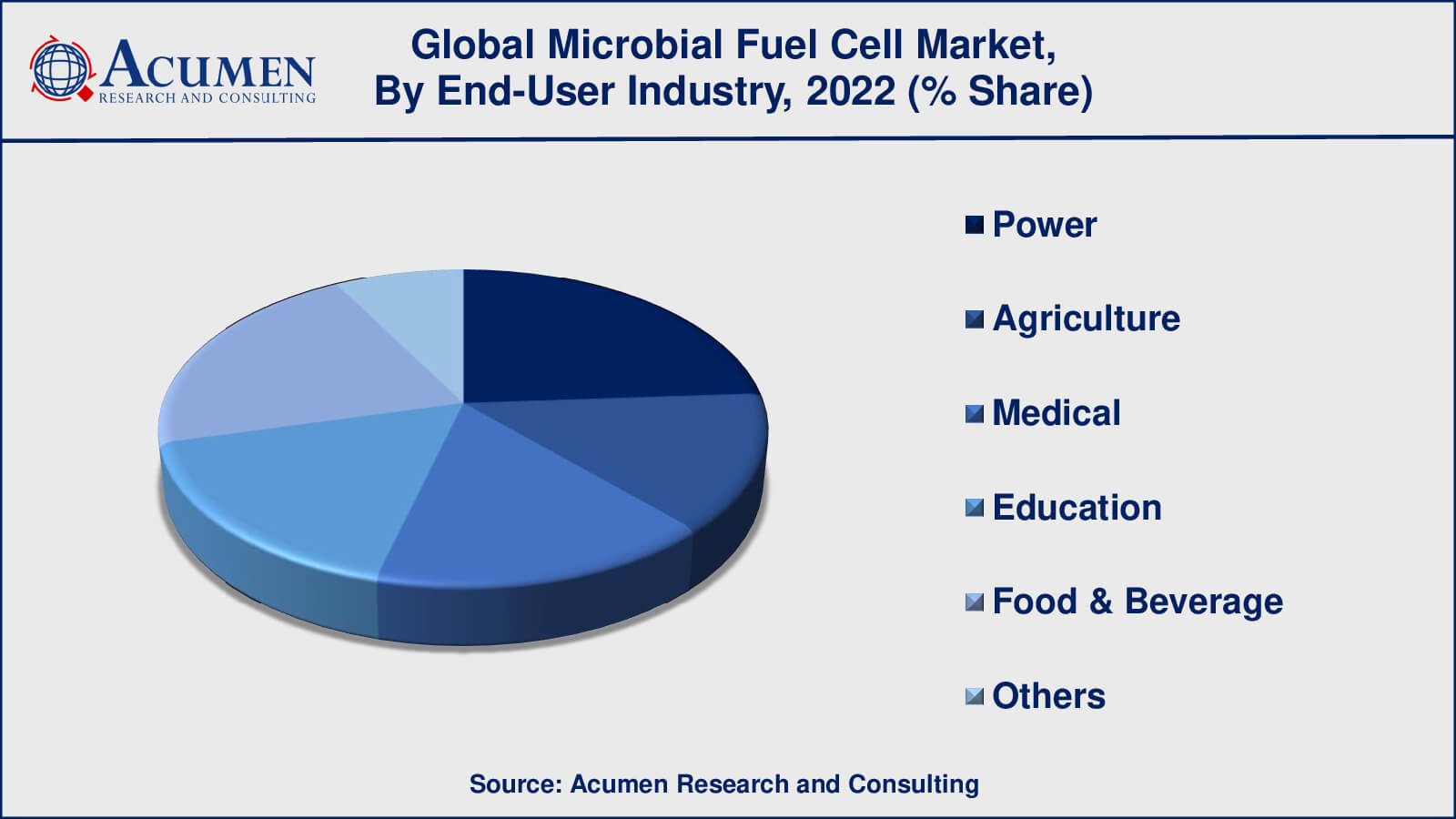Microbial Fuel Cell Market Size - Global Industry, Share, Analysis, Trends and Forecast 2023 - 2032
Published :
Report ID:
Pages :
Format :
Microbial Fuel Cell Market Size - Global Industry, Share, Analysis, Trends and Forecast 2023 - 2032
Report Coverage
- Industry Dynamics
- Market Size and Forecast Data
- Segment Analysis
- Competitive Landscape
- Regional Analysis with a Niche Focus on Country-Level Data
- High Level Analysis - Porter's, PESTEL, Value Chain, etc.
- Company Profiles of Key Players
- Option to Customize the Report As Per Your Specific Need
Request Sample Report
The Global Microbial Fuel Cell Market Size accounted for USD 275.5 Million in 2022 and is estimated to achieve a market size of USD 438.2 Million by 2032 growing at a CAGR of 4.8% from 2023 to 2032.
Microbial Fuel Cell Market Highlights
- Global microbial fuel cell market revenue is poised to garner USD 438.2 million by 2032 with a CAGR of 4.8% from 2023 to 2032
- North America microbial fuel cell market value occupied more than USD 83 million in 2022
- Asia-Pacific microbial fuel cell market growth will record a CAGR of more than 5% from 2023 to 2032
- Among type, the mediator-free microbial fuel cell sub-segment generated over US$ 165 million revenue in 2022
- Based end-user industry, the packaging sub-segment generated around 65% share in 2022
- Advancements in technology is a popular microbial fuel cell market trend that fuels the industry demand

A microbial fuel cell (MFC) is a bio-electrochemical system used to create electricity by using bacteria found in the atmosphere. These bacteria are capable micro creatures that can discard contaminants, and can even produce electricity. Microbial fuel cells (MFC) can extract electrons from their nourishment sources. Along these lines, they can even transform simple soil into an origin of vitality. In wastewater treatment, the use of MFCs had created new business opportunities for market players. Microbes eliminate electrons from the organic medium and transmit them to the anode present in an anaerobic chamber. The electrons move across the resistor to the cathode where they combine with protons, and oxygen to form water.

Global Microbial Fuel Cell Market Dynamics
Market Drivers
- Increasing demand for renewable energy sources
- Growing awareness of the benefits of MFCs
- Government support and incentives
- Increasing demand for wastewater treatment
Market Restraints
- High costs of MFCs
- Lack of standardization
- Complexity of maintenance
Market Opportunities
- Increasing focus on sustainability
- Potential for integration with other technologies
- Growth in developing countries
Microbial Fuel Cell Market Report Coverage
| Market | Microbial Fuel Cell Market |
| Microbial Fuel Cell Market Size 2022 | USD 275.5 Million |
| Microbial Fuel Cell Market Forecast 2032 | USD 438.2 Million |
| Microbial Fuel Cell Market CAGR During 2023 - 2032 | 4.8% |
| Microbial Fuel Cell Market Analysis Period | 2020 - 2032 |
| Microbial Fuel Cell Market Base Year | 2022 |
| Microbial Fuel Cell Market Forecast Data | 2023 - 2032 |
| Segments Covered | By Type, By Application, By End-User Industry, And By Geography |
| Regional Scope | North America, Europe, Asia Pacific, Latin America, and Middle East & Africa |
| Key Companies Profiled | Triqua International BV, Cambrian Innovation Inc., Electrochaea, Emefcy (Fluence Corporation), MICROrganic Technologies, Inc., Microbial Robotics LLC, MICROM Bioenergy Inc., Prongineer R&D Ltd., Pyro-Energen Technologies Inc., and Sainergy Tech, Inc. |
| Report Coverage |
Market Trends, Drivers, Restraints, Competitive Analysis, Player Profiling, Covid-19 Analysis, Regulation Analysis |
Microbial Fuel Cell MFC Market Insights
A microbial fuel cell is a boon in various complex applications such as water treatment, commercial waste treatment, and hydrogen generation among others as a microbial fuel cell can create electricity from a wide range of fuels. A microbial fuel cell can ingest any organic material to generate power and is considered a promising factor fueling market growth. However, a microbial fuel cell cannot generate consistent primary power and is operative until the microbes are kept alive. Changes in temperature, fuel, and contaminants could all pose a problem for the commercial MFCs and such factors are halting the market growth. MFCs are capable of transforming chemical energy into electricity and are a clean, safe, and easy source of electrical power which is attracting a huge profit ascertaining future market.
Microbial Fuel Cell (MFC) Market, By Segmentation
The worldwide market for microbial fuel cell is split based on type, application, end-user industry, and geography.
Microbial Fuel Cell (MFC) Market, By Type
- Mediator Microbial Fuel Cell
- Mediator-Free Microbial Fuel Cell

According to an industry analysis of microbial fuel cells, mediator-free microbial fuel cells (MFCs) appear to be a rapidly expanding category of the MFC market. This is due, in part, to their ability to lower expenses and enhance sustainability by removing the need for costly and potentially toxic mediator compounds. However, because MFC technology is still in its early stages of commercialization, the relative sizes of different MFC segments may keep changing as the technology evolves and new applications are discovered.
Microbial Fuel Cell (MFC) Market, By Application
- Education
- Power Generation
- Water Waste Treatment
- Biorecovery
- Biosenor
- Others
In 2022, power generation was the dominant application in the microbial fuel cell MFC market. MFCs have demonstrated significant potential as a sustainable and environmentally friendly alternative to traditional fossil fuels for power generation, and have been the subject of extensive research and development in recent years. The MFC market, however, is still in its early stages of commercialization, and the relative sizes of different application segments may continue to shift as technology evolves and new applications are discovered.
However, as a rapidly growing application of MFC technology, water waste treatment has shown promise. MFCs have been shown to be effective in wastewater treatment by removing organic pollutants and producing clean water while also producing electricity as a byproduct. MFCs' dual function makes them an appealing option for wastewater treatment plants, especially in areas where energy is in short supply.
Microbial Fuel Cell (MFC) Market, By End-User Industry
- Power
- Agriculture
- Medical
- Education
- Food & Beverage
- Others

As per the microbial fuel cell market forecast, the power industry is expected to dominate the MFC market. MFCs have demonstrated significant potential as a sustainable and environmentally friendly alternative to traditional fossil fuels for power generation, and have been the subject of extensive research and development in recent years. However, the MFC market is still in its early stages of commercialization, and the relative sizes of various end-user industry segments may continue to shift as technology evolves and new applications emerge. Agriculture, medical, education, food and beverage, and other industries may also offer great advantages for the application of MFC technology.
Furthermore, the agriculture industry has shown promise as a rapidly growing end-user of MFC technology, particularly in soil remediation, water treatment, and sustainable farming practises. By generating renewable energy, reducing greenhouse gas emissions, and improving soil and water quality, MFC technology has the potential to provide significant benefits to agriculture.
Microbial Fuel Cell Market Regional Outlook
North America
- U.S.
- Canada
Europe
- U.K.
- Germany
- France
- Spain
- Rest of Europe
Asia-Pacific
- India
- Japan
- China
- Australia
- South Korea
- Rest of Asia-Pacific
Latin America
- Brazil
- Mexico
- Rest of Latin America
The Middle East & Africa
- South Africa
- GCC Countries
- Rest of the Middle East & Africa (ME&A)
Microbial Fuel Cell Market Regional Analysis
North America is expected to be a significant market for MFCs, owing to government initiatives to promote renewable energy and increased investments in MFC technology research and development. Because of its large number of research institutions and companies involved in MFC technology development, the United States has been a major contributor to the growth of the North American MFC market.
Europe is expected to be a major market for MFCs, with countries such as Germany, the United Kingdom, and France leading the way. Government support for renewable energy and rising demand for sustainable solutions in various industries are driving the growth of the MFC market in Europe.
In terms of growth rate, the Asia Pacific region was expected to have the fastest growth in the MFC market due to increased investments in renewable energy sources, increased awareness of the benefits of MFCs, and rising demand for clean energy in countries such as China and India. However, because market conditions and trends are constantly changing, this may have changed since my knowledge cutoff date.
Microbial Fuel Cell Market Players
Some of the top microbial fuel cell companies offered in the professional report include Triqua International BV, Cambrian Innovation Inc., Electrochaea, Emefcy (Fluence Corporation), MICROrganic Technologies, Inc., Microbial Robotics LLC, MICROM Bioenergy Inc., Prongineer R&D Ltd., Pyro-Energen Technologies Inc., and Sainergy Tech, Inc.
Frequently Asked Questions
What was the market size of the global microbial fuel cell in 2022?
The market size of microbial fuel cell was USD 275.5 million in 2022.
What is the CAGR of the global microbial fuel cell market from 2023 to 2032?
The CAGR of microbial fuel cell is 4.8% during the analysis period of 2023 to 2032.
Which are the key players in the microbial fuel cell market?
The key players operating in the global market are including Triqua International BV, Cambrian Innovation Inc., Electrochaea, Emefcy (Fluence Corporation), MICROrganic Technologies, Inc., Microbial Robotics LLC, MICROM Bioenergy Inc., Prongineer R&D Ltd., Pyro-Energen Technologies Inc., and Sainergy Tech, Inc.
Which region dominated the global microbial fuel cell market share?
North America held the dominating position in microbial fuel cell industry during the analysis period of 2023 to 2032.
Which region registered fastest CAGR from 2023 to 2032?
Asia-Pacific region exhibited fastest growing CAGR for market of microbial fuel cell during the analysis period of 2023 to 2032.
What are the current trends and dynamics in the global microbial fuel cell industry?
The current trends and dynamics in the microbial fuel cell industry include increasing demand for renewable energy sources, growing awareness of the benefits of MFCs, and government support and incentives.
Which type held the maximum share in 2022?
The mediator-free microbial fuel cells type held the maximum share of the microbial fuel cell industry.



